
审判者
FINAL FANTASY零式HD渣作
- 精华
- 15
- 帖子
- 11062
- 威望
- 39 点
- 积分
- 12381 点
- 种子
- 6 点
- 注册时间
- 2004-6-19
- 最后登录
- 2025-3-2
|
求原版下载。。。。
~~~~~~~~~~~~~~~~~~~~~~~
在kunlun看到某帖发现蛋蛋确实在向the foundation series靠拢阿~
作者是Isaac Asimov(美剧HEROES里的预测男也叫Isaac吧,明显不是巧合)
此小说一共有7部--其中比较值得一看的是正传三部曲,外传的一个前传,还有一个前传到正传的次前传。。。(汗,惊人相似啊,蛋蛋正传分季播,还有蛋蛋F,蛋蛋P,和蛋蛋V作为一系列外传)
具体说什么我就转那个帖咯
~~~~~~~~~~我转贴~~~~~~~~~~~~~
顺便介绍下哈里谢顿。。。哈里谢顿。。。心理历史学的创造者,通过心理历史学预测人类必将进入数万年的黑暗时期,于是建立谢顿计划,建立第一第二基地作为人类文明的火种,大大提高人类复兴的速度。。。。在基地系列的前五本小说中哈里·谢顿仅亲自出现过一次,但每当谢顿危机发生,他会谢顿穹窿中的全息信息中现身。
所谓谢顿危机,就是指根据哈里谢顿的预测,谢顿计划可能发生的巨大的关键性危机。。。
而所谓心理历史学。。。那就是人类科幻史上最神棍最逆天但又最让人折服的理论。。。
单个的粒子运动测不准,大量的成亿上兆的粒子组成的宏观体就可以通过牛顿定律进行计算
单个人类行为无法预测,大量的成亿上兆的大规模人群的活动产生的一系列经济社会***效应却可以预测。。。
这就是心理历史学的基本假设。。。。
维基版解释“心理历史学是美国著名科幻小说家,科普作家艾萨克.阿西莫夫的科幻巨著“基地”三部曲中作者杜撰的一种学科,这种学科以超过200万人为研究对象,用历史上大规模人群的活动产生的一系列经济社会***效应,对此分析,试图得出普遍的规律,用此规律来预测人类社会的发展。其创始人是哈里·谢顿,其用此理论成功的预见了未来银河人人将会经历一段长达三万年、充满无知、野蛮和战争的黑暗时期和第二银河帝国的出现。
~~~~~~~~~转好了~~~~~~~~~~~~~~~~
各部摘要
~~~~~~~~~~~~~~~~~~~~~~~~~~~~~~~~~~
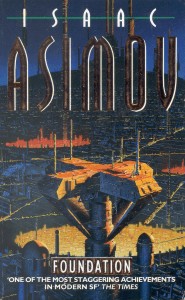
Don't tell me you haven't heard of the Foundation series before? No? Well, it's the tale of the fall of the Galactic Empire and the rise of the Foundation. Pretty normal so far, except for the fact that the Foundation's destiny is guided by psychohistory, a scientific method of predicting the future, developed the the Foundation's founder, Hari Seldon. Hari Seldon plots the paths of the Foundation, from its start to, one thousand years later, its leadership of the galaxy.
In 'Foundation', the early golden days of the Foundation are told, of how the society managed to gain survival and ultimately pre-eminence in it's local sector, not through violence, but through cunning.
Buy this book. Now. It might be old, but it's still possibly the best sci-fi book in existence.
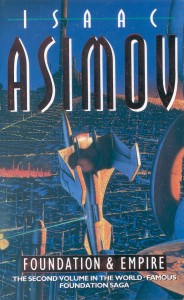
Foundation and Empire picks up the ball from Foundation. First, the Foundation must deal with still-strong remains of the Galactic Empire and its expert General Bel Riose.
Then, in the second half of this book, is how a wildcard drops into the Foundation universe; the Mule. This individual, on his own, manages to upset the cornerstone of the Foundation; Hari Seldon's psychohistorical plan. Unlike the unbridled optimism and triumph of the first Foundation book, the Foundation and the characters of this book suffer their fair share of misfortune.
To be honest, I quite liked the idea of the Mule. If it weren't for him, the entire series would have just stagnated - it's one thing to have the Foundation win against vicious foes in the first book, directed by the Second Foundation, but you can't have that for three books. No, something tangible has to threaten the entire shebang.
The ending of the book is, well, different, for a change. Read it and see.
Not quite up to the standard of Foundation, but it's still a must-buy if you enjoyed the previous book at all. A very good book in it's own right.
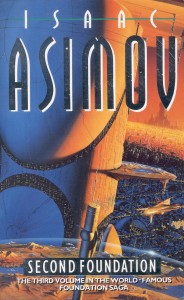
I hesitate to give Second Foundation the same rating as Foundation and Empire. I'm not sure why, I just don't think it's up to scratch. Still a wonderful read, though.
The first half deals with the downfall of the Mule, while he searches for the elusive, hidden and powerful Second Foundation, a society of mentalics. The second half skips forward a number of years to when the Foundation is once again in control, and another search for the Second Foundation begins apace.
Second Foundation possibly wins the 'Greatest number of end-plot twists' award, during the phase in which the Foundation is searching for the Second Foundation. Still, you have to appreciate the thinking Asimov must have put into it, and it's a pleasant surprise to find out who, and where, the Second Foundation really are.
It's a little strange how this books appears to be split completely into two parts. You wonder whether it would have been better for first half of the book to have been stuck onto Foundation and Empire, and the second half expanded, made a little more exciting and turned into a proper story.
~~~~~~~~~~~~~~~~~~~~~~~~~~~~~~~~
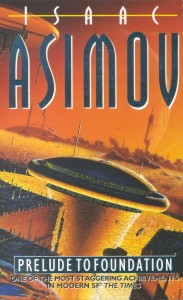
Now, you'd think 'Well, it can't get much worse, can it?' Luckily, it doesn't. Prelude to Foundation is set before the first Foundation book, and features the exploits of Hari Seldon, as he is chased across the capital of the Galactic Empire, Trantor, by nasty individuals who want him for his theory of psychohistory.
It's not a new premise for a novel (in fact, I use a variation myself in Unavoidable Casualties), but it's tried and tested, and it works. It's a little like Foundation's Edge, except it's slightly more original - it features new material. A good read.
Should I read this book first?
To those new to the Foundation universe, don't read this book first, even though it is chronologically the first in the Foundation universe. Read the original trilogy first, then read this book, then Forward the Foundation. Then, if you have any money left, read Foundation's Edge and Foundation and Earth.
~~~~~~~~~~~~~~~~~~~~~~~~~~~~~~~~~~~~
Forward the Fundation
To be honest, I wasn't expecting much from this book. After all, what can Asimov write about that happens in between Prelude to Foundation, and Foundation? As it happens, quite a lot.
Forward the Foundation is much graver book than any of the others in this series, and charts the fortunes of Hari Seldon, as he tries to develop his psychohistory theory before the fall of the Galactic Empire. He has quite an eventful time, and many events occur that you wouldn't expect - not because they're surprising, but because you think that bad things aren't supposed to happen in the Foundation series - after all, it's Asimov writing this.
You don't need Prelude to Foundation to read this - I didn't. An excellent swansong from Asimov, who tragically died soon after finishing this book. In many ways it is believed to be something of an autobiography, although I don't exactly agree. The endings are, inevitably, the same.
~~~~~~~~~~~~~~~~~~~~~~~~~~~~~~~~~~~
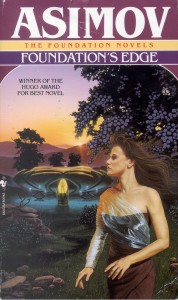
Now, many people don't actually like any books outside the first Foundation trilogy (the three above books), since all the others were written decades after them. Foundation's Edge is a fair book, but it doesn't contain any of the originality or strength of the original trilogy.
The Foundation is the most powerful society in the galaxy, and soon enough, will rule the entire galaxy. But Councilman Golan Trevize thinks otherwise. He believe that the Foundation did not destroy the Second Foundation, and that they are still being controlled by the mentalics.
Golan, and his scholarly companion Janov Pelorat go on a quest to find the Second Foundation in a state-of-the-art spacecraft. While this is happening, we see events from the view of a member of the Second Foundation, Speaker Gendibal, who believes that the Second Foundation is being manipulated by yet another organisation. Eventually, the two Foundations and this mysterious newcomer meet up in a, well, strange finale.
I got the feeling that this book was slightly aimless, and dragged at parts. It's not bad, but it's not a 'must buy.'
As you can see, this book cover is a little different from the rest - I bought it while I was in America, and it's the Bantam/Spectra edition, IMHO inferior to the British product.
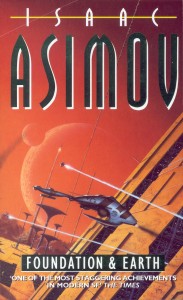
Pretty much the same as Foundation's Edge. This book attempts to marry both the Foundation series, and Asimov's other renowned series, the Robots.
Again, it's not that bad, but you get the feeling that Asimov is just trying to cash in. It just seems like a romp around the old words featured in the Robots series - there's nothing new in this book. It defies the writing of a summary because it's so diffuse. Nothing happens. I don't care. It's not a book that sticks in your mind.
In fact, I would go so far as to suggest that you shouldn't even bother reading Foundation's Edge or Foundation and Earth. There are many other good books out there, and some of them are by Asimov, as well. If you really want to read Foundation, read the prequels. They're far better.
Buy this book if you liked Foundation's Edge, or if you want a full bookshelf. Just remember that there are a lot of much better books out there that are worth your money.
~~~~~~~~~~~~~~~~. |
|
 川公网安备 51019002005286号
川公网安备 51019002005286号